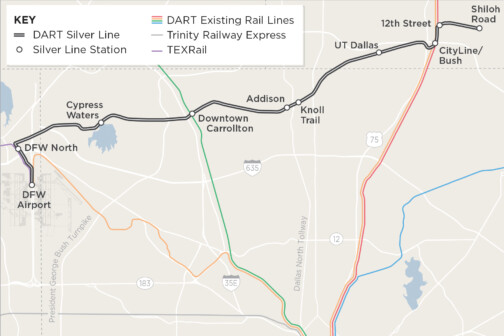After a messy hours-long back and forth about leverage and legalese, the Dallas City Council clenched its collective jaw and voted to accept an agreement with Dallas Area Rapid Transit to accept about $90 million in excess sales tax revenue.
The 12-3 vote ended a debate that began about four months ago. DART in February abruptly reneged on its vow to pay Dallas $111 million that could be used to fund transit-adjacent projects such as sidewalk fixes, traffic signal upgrades, ramps compliant with the Americans With Disabilities Act, a trail through Oak Cliff, and about a half dozen other projects.
Instead, the agency’s top officials told Dallas that the payout would actually be closer to $30 million. DART saw a chance to recoup $36 million it says it spent on “project enhancements” for the Silver Line train project through Far North Dallas. Too, permitting and project review delays for the rail line had cost the agency close to $50 million, it argued.
The money was presented as a green olive branch to its 13 member cities. Because of all the federal coronavirus relief money DART received, it collected about $234 million extra in sales tax revenue. It decided to give it back, with the disbursements based on how much each city paid into the agency in sales tax. Dallas would get $111 million and the rest would be split among the 12 suburbs. DART doesn’t control infrastructure in its partner cities, and the money would be used for projects that could help its riders once they exit a bus or train.
DART also saw an opportunity. Because it didn’t have to give up that money, it could define the terms of the agreement. It became a rare chance to invoice Dallas for what it presented as overages for the Silver Line project. That didn’t go over well with the City Council, which, after getting the news in February, directed staff to work with its partners to reach an agreement.
The North Central Texas Council of Governments helped negotiate a deal that jumped the $28 million to $90 million.
“In the last 60 days, the city of Dallas and DART have already demonstrated a new relationship,” said Michael Morris, the transportation director of NCTCOG. He mediated between the two parties and helped claw back money for the city. “I think there is tremendous progress being made. I have committed to monitor the situation to make sure that is actually what is going to occur.”
Today’s vote was to accept the terms of what’s known as an “interlocal agreement” or ILA, which is a contract between two public entities that allows one to pay the other. The messy part: interim City Attorney Tammy Palomino covered the ILA with red ink in a memo to Council ahead of the vote.
Councilwoman Gay Donnell Willis, who represents Preston Hollow, went through Palomino’s critiques. The attorney wrote that she had “serious concerns” about the language, in which she also found “deficiencies,” and the “potential to end up in an endless cycle” of Dallas being unable to meet DART’s expectations.
Willis joined two of her colleagues in voting against the approval. One was Councilwoman (and frequent DART critic) Cara Mendelsohn, whose Far North Dallas district is where the 3 miles of the Silver Line cross through Dallas. Outgoing Councilman Adam McGough also balked at signing off on the language.
The legal concerns, he said, “are problematic to the point where I don’t feel comfortable supporting at this time.”

City Manager T.C. Broadnax laid out the stakes. Don’t accept the ILA, don’t get the money.
He said that DART CEO Nadine Lee and its top attorney told the city that it would not accept any changes to the language in the contract. Its arrangement is essentially a grant proposal. The city applies for funding for specific projects, DART decides whether they sufficiently complement transit, then signs off on them. The city gets 10 percent of the cost up front, then seeks further reimbursement each month until the project is finished.
Most council members seemed to agree that the arrangement was not ideal but recognized this was the price of free money. Broadnax said it was unlikely the projects would be funded without it. All the other cities have signed the ILA, even though their city attorneys had similar concerns over the language, the city manager said.
“The money is green. We’ve got needs and it’s their resources to give,” he said. “They don’t have to give them.”
Mendelsohn said the agreement’s language was so broad that DART could back out again. She used the initial $80 million reduction as her evidence but was rebuffed by Morris and city staff. After the negotiations, they said they came away confident that DART would fulfill its end of the bargain. Staff was drafting a memorandum of understanding to give the city some protection, but it isn’t legally binding.
“We will not see this money, and it will further erode our relationship when it happens,” Mendelsohn said. She proposed a six-week delay to give staff more time to make its case to DART. Her motion failed 11-4.
“I feel like the words coming out of my mouth, people don’t understand,” Broadnax said. “They are not going to amend and change the ILA. Period. Full stop. To want and think that that is a possibility, you might as well ask if a unicorn is gonna float in here. It’s not going to happen.”
Nobody seemed thrilled giving DART so much control. But the 11 council members and the mayor agreed that doing so was the only way the city would see the money.
It is yet another chapter of the conflict between Dallas and its transit partner. DART serves the region, of which Dallas is just a part. Dallas’ transportation priorities don’t always align with those of its neighbors, despite the Dallas Council appointing a majority of the DART board.
Councilwoman Paula Blackmon floated the possibility of lobbying state lawmakers to propose legislation that would give the city more power in negotiations such as these. She wound up voting in favor of the ILA but voiced her concerns.
“It just seems very one-sided,” she said. “A partnership is not holding people hostage.”
Other cities have been more aggressive in pushing DART. Plano state Rep. Matt Shaheen this year filed a House bill to audit “certain regional transportation authorities.” He said he did so in tandem with the city of Plano, which has been asking for an independent analysis of the return on investment for each member city.
Tensions are high, particularly in Mendelsohn’s district. The City Council gritted its teeth and voted “yes” amid staff’s vow of repairing a relationship. But there are fissures showing between the region’s public transit provider and the cities it serves, and it’s something to pay attention to.
Here are the projects Dallas says it will pursue with the $90 million:
- Reconstruction of 22 traffic signals at intersections along major DART bus route corridors, with priority given to those routes in Equity Priority Areas
- Completion of phase 1 of the Sidewalk Master Plan
- Construction of more than 90 percent of missing ramps near DART bus stops and light rail stations
- Funding for the FY 2024 traffic lane markings program
- Bike lane upgrades
- A city of Dallas parking operations study and smart parking pilot projects
- Support for DART passes that the City distributes to middle and high school students for free, and support for transit services for homeless individuals
- Funding for ongoing maintenance of the City-owned Dallas Streetcar, and professional services for studies to optimize operations
The money will also help fund part of the Five Mile Creek trail through Oak Cliff. Dallas will spend $10 million from its DART money and get $15.4 million back from the North Central Texas Council of Governments. You can read more about that project here.
Author






